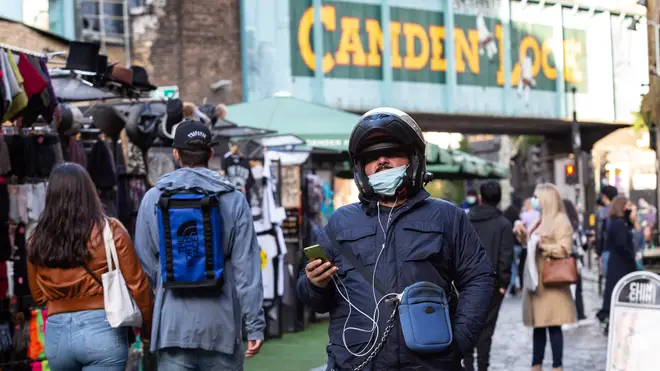
Nick Abbot 10pm - 1am
13 October 2020, 10:42 | Updated: 13 October 2020, 11:00

London could impose Tier 2 restrictions with new limits on pubs and restaurants within days, according to reports.
The capital has seen a rise in Covid-19 cases with 7,700 in the last week.
It comes after Boris Johnson announced a new "tiered" system to deal with coronavirus.
The new system in England will see areas put into different categories labelled as medium, high or very high risk.
Pubs and bars across Merseyside will close unless they serve food and alcohol as part of a sit-down meal, as the Liverpool city region moves into the "very high" alert level.
Tier 2 will see a ban on mixing between households with the rule of six still in place.
Read more: Boris Johnson confirms new three-tier lockdown system
Read more: More patients in hospital with Covid now than at start of lockdown

'We just don't know' pub landlady tells LBC the rules and future
Pubs and restaurants will remain open but the ban on mixing between indoors is expected to apply to the hospitality sector, which will serve another blow to the already embattled industry.
London mayor Sadiq Khan has warned the capital could move into a higher tier of coronavirus restrictions "potentially even this week".
The city will initially be "medium" on the new scale, but a spokesman for Mr Khan said: "The mayor met with London leaders to examine the latest data on the spread of the virus in the city and to discuss the Government's new national alert system.
"The virus is now spreading very quickly in every corner of London. The number of cases is rapidly increasing and all the indicators we look at are moving in the wrong direction.
"As of today, London is at 'medium' in the Government's new alert levels. However, Londoners should understand that this could change very quickly - potentially even this week."
Listen & subscribe: Global Player | Apple Podcasts | Google Podcasts | Spotify
MPs will debate and vote on the measures on Tuesday and, should it be approved, the tiered system will come into effect on Wednesday.
Addressing a Downing Street press conference, Mr Johnson said cases nationally had gone up four times in four weeks, there are more Covid-19 patients in UK hospitals than on March 23 when the country went into lockdown, and deaths are rising.
Prof Whitty warned the measures could become stricter should more be required to suppress the virus.
He told the Downing Street press conference: "I am not confident, and nor is anybody confident, that the Tier 3 proposals for the highest rates... if we did the absolute base case, and nothing more, would be enough to get on top of it."
Mayor Sadiq Khan said: “It is highly likely that Londoners will also face more restrictions very soon because cases are rising so quickly across the city.”
Mr Johnson said he did not want another national lockdown but did not rule one out either, adding he would not impose such "extreme" measures "right now".
The Government has been accused of ignoring its own scientists after documents showed that a "circuit-breaker" lockdown was recommended for England by expert advisers three weeks ago.
The Scientific Advisory Group for Emergencies (Sage) suggested immediately introducing a national lockdown lasting between two and three weeks to halt the rapid spread of the virus, with the Government's failure to act on the advice branded "alarming" by Labour.
Downing Street insisted that "robust but targeted and proportionate" action had been taken in September, including the rule of six and the 10pm hospitality curfew.
The Sage document, dated September 21 and released hours after Prime Minister Boris Johnson announced his three-tier system of alert levels for England, said a package of interventions was needed to reverse the "exponential" rise in cases.
The paper set out a shortlist of non-pharmaceutical interventions (NPIs) that should be considered for "immediate" introduction, also suggesting that all university teaching should be online unless face-to-face teaching was "absolutely essential" at a time when students were starting or returning to university.
Top of the list was a short period of lockdown known as a circuit-breaker "to return incidence to low levels", followed by advice to work from home for all those who can.
Third on the list was "banning all contact within the home with members of other households (except members of a support bubble)", and fourth was the closure of all bars, restaurants, cafes, indoor gyms, and personal services such as hairdressers.
Read more: More patients in hospital with coronavirus now than at start of lockdown